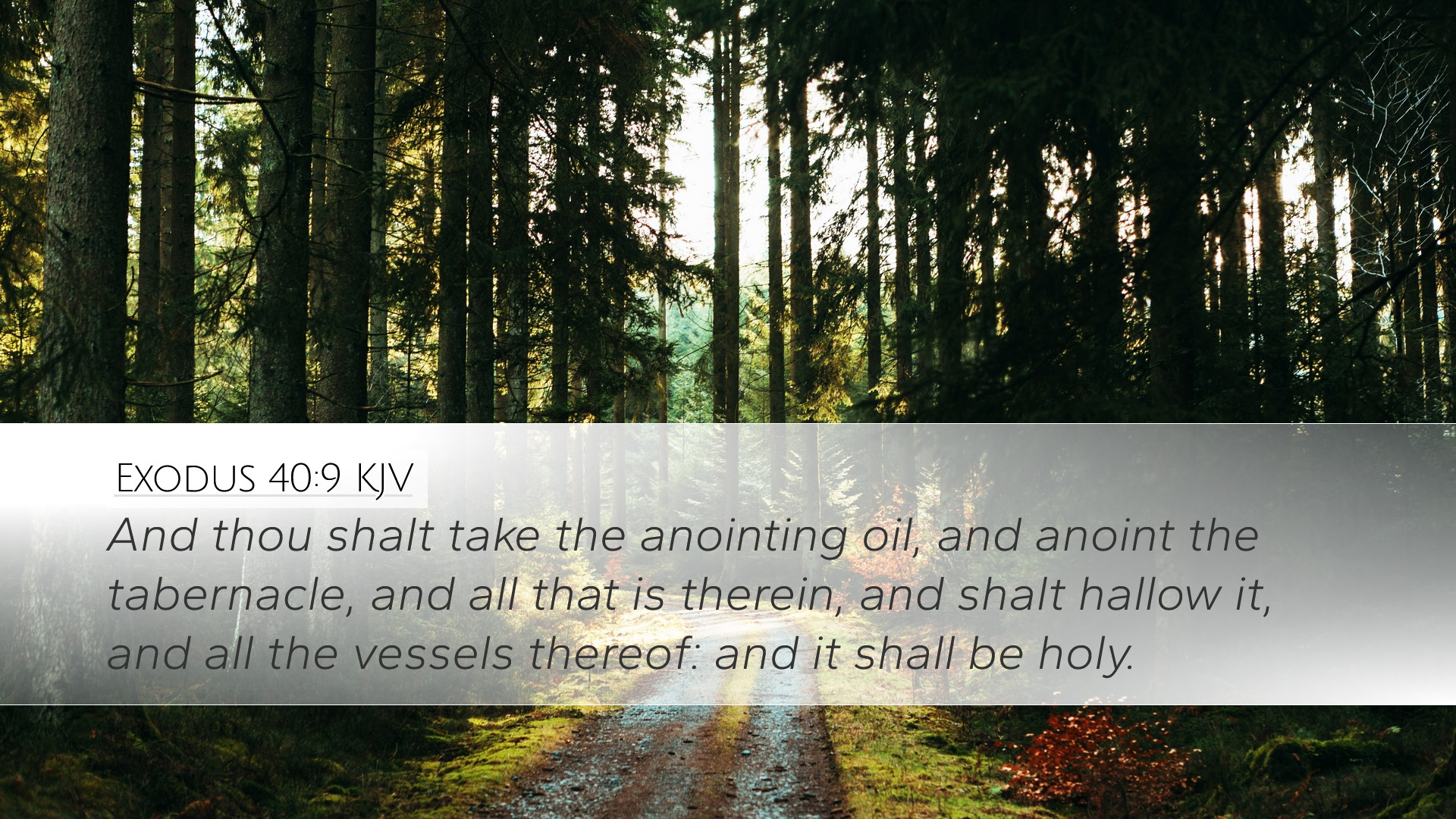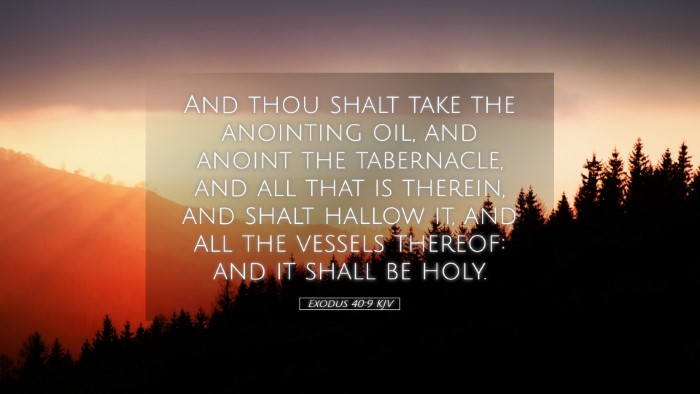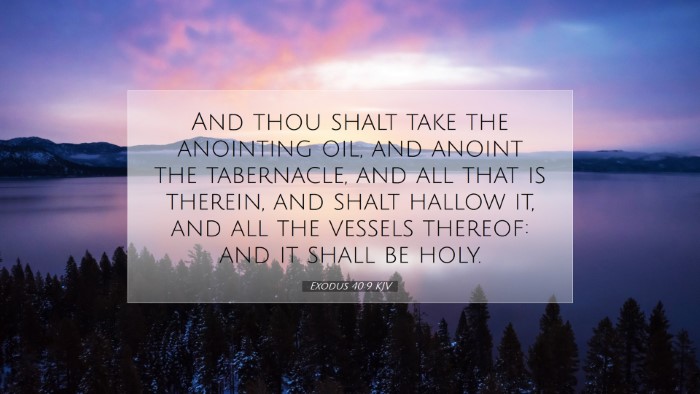Commentary on Exodus 40:9
Exodus 40:9 states:
"Then you shall take the anointing oil and anoint the tabernacle and all that is in it, and consecrate it and all its furnishings; and it shall be holy."
Introduction
This critical moment in the closing chapters of Exodus marks the culmination of the Lord’s instructions to Moses regarding the tabernacle, the place where God would dwell among His people. The act of anointing with oil symbolizes the sanctification and dedication of the tabernacle, and it sets the tone for understanding the sacred nature of the Israelites' worship and the presence of God amongst them.
Significance of Anointing
The act of anointing is rich with meaning in the biblical narrative. The following insights can be drawn from several public domain commentaries:
- Matthew Henry: Henry points out that anointing signifies separation for God's service. This act was essential for dedicating not only the physical structure of the tabernacle but also all the items within it, marking them as sacred vessels.
- Albert Barnes: Barnes emphasizes that the use of anointing oil is a symbol of the presence of the Holy Spirit. It represents divine enablement, indicating that all that is consecrated is fully under God’s control and blessing.
- Adam Clarke: Clarke remarks on the comprehensive nature of this anointing act, involving the altar, vessels, and the priests, highlighting that it implies a transferal of divine holiness upon all aspects of the worship system.
Consecration and Holiness
The concept of holiness is central to this verse. The anointing establishes a clear boundary between the sacred and the common. The following points illustrate this theme:
- Matthew Henry: He asserts that holiness pervades every detail of worship and that this moment is significant as it represents God’s desire to dwell among His people. The consecration prepares the tabernacle for divine service.
- Albert Barnes: Barnes discusses the importance of maintaining holiness in worship. He argues that the anointing serves as a reminder that the worship of God requires a certain reverence and purity that is established by God himself.
- Adam Clarke: According to Clarke, the holiness required for worship reflects the character of God. The passage illustrates how God sets apart people and places for Himself, indicating His loving desire to have an intimate relationship with humanity.
The Tabernacle as a Theological Symbol
The tabernacle, as described in Exodus, serves not only as a place of worship but also as a powerful theological symbol. Insights from commentaries expand on this understanding:
- Matthew Henry: Henry believes that the tabernacle foreshadows Christ, who is the true dwelling of God among men (John 1:14). The physical anointing signifies a greater spiritual reality, wherein Christ, as the anointed one, fulfills the ultimate role of mediator between God and humanity.
- Albert Barnes: Barnes suggests that the design and structure of the tabernacle reflect God's holiness and righteousness. Each aspect of the tabernacle's construction and the ensuing anointing points to God’s method of approaching sinful humans through participant representation.
- Adam Clarke: Clarke highlights the role of the tabernacle in the covenant relationship between God and Israel. The consecration of the tabernacle signifies God's commitment to be present with His people and confirms the covenantal promises bestowed upon them.
The Role of Leadership in Worship
The verse places significant responsibility on Moses as the appointed leader to carry out these instructions. Considerations from the commentaries provide insights into the nature of leadership in worship:
- Matthew Henry: Henry emphasizes the importance of obedience in leadership. Moses must follow God’s commands precisely, which emphasizes how leaders must seek to align their actions with God’s directives in matters of worship.
- Albert Barnes: Barnes points out that the efficacy of the anointing depended on Moses’ faithful execution of the task. This teaches that leaders have a significant role in preparing the way for collective worship.
- Adam Clarke: Clarke mentions that Moses acted as a type of mediator. His involvement signifies that leaders are called to dedicate not just physical spaces but also to prepare the hearts of the people for worship.
Conclusion: Reflections on Worship
Exodus 40:9 conveys profound truths about worship that transcend the ancient context and continue to resonate today. The implications of anointing, holiness, the significance of the tabernacle, and the role of leadership provoke thoughtful reflections for modern pastors, students, theologians, and scholars:
- The importance of setting apart time and space for meeting with God.
- The need for a heart of holiness when approaching God in worship.
- A recognition that the church today serves as the body of Christ, embodying the sacredness established in the tabernacle.
- The necessity for faithful and obedient leaders to guide the congregation in reverent worship.
As we glean from these insights and apply them, we recognize that the act of worship, much like the anointing of the tabernacle, is both a privilege and a calling, requiring dedication, reverence, and a heart aligned with God’s purposes.


